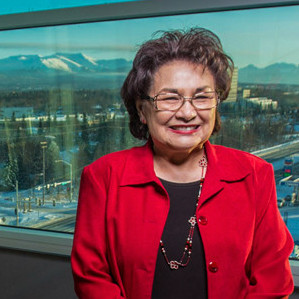Local perspective on Eklutna

“I haven’t retired. I keep hearing that rumor, but I never said I was retiring,” insists Debbie Fullenwider. Since 1973, she’s served in a variety of leadership positions on the Eklutna Inc. board of directors, including president and vice president. “I was the first president of the Eklutna board, and I think it was very unheard of then for a woman to be president. But the shareholders voted me in and the board elected me president.”
She’s not done serving shareholders and the people of Eklutna; she’s just taking some time off from the board of Eklutna Inc. But Fullenwider’s sense of responsibility won’t allow her to be idle. She currently serves on the Anchorage Centennial Advisory Committee, helping to organize a year of events celebrating Anchorage’s 100th anniversary.
Fullenwider, who has been a director for both CIRI and Cook Inlet Tribal Council (CITC) in addition to working for the Federal Emergency Management Agency, is motivated by the example of her grandfather, Chief Alex Vasily, the last tribal chief and medicine man of Eklutna.
“My grandfather was Athabascan, like myself, and we’re quiet people,” she describes. “We go in, we think things over; whatever it is we need to get done, we do. My grandfather taught me that it doesn’t matter if you’re male or female. You have responsibility. You do what’s right for your people.”
Part of doing what’s right, for Fullenwider, is acting as a good steward of Eklutna’s lands and making sure that, even as Eklutna continues to change and grow, the traditional Dena’ina culture of the village is honored and preserved. In 2010, she donated a portion of her grandfather’s regalia, carving knives and other rare items to CITC as part of an exhibit of Dena’ina artwork and cultural objects.
“I never learned Athabascan,” Fullenwider recalls. “My mother was afraid if I learned the language, they’d make fun of me at school. I had to speak very good English.” So she didn’t understand her grandfather, who only spoke Athabascan, or know what was happening when she was a young girl with a terrible cold and Chief Vasily sprinkled oil, rang a bell to chase off evil spirits, then made her a tea of dried devil’s club.
“I was scared! I didn’t know what was going on. But my grandfather healed people; that was his gift. My mother would translate for him. Now, I’m proud of my cousin, Aaron [Leggett], who is learning a dialect of Athabascan.”
The sense of responsibility Fullenwider’s grandfather instilled in her extends to other members of her family, too, including Aaron’s brother, Adam. “I’m very proud of him, too—he’s running for the board of the Native Village of Eklutna. And my daughter, Kim Zello—I groomed her for all these years so one day, if I retire, she can take my place.”
“If” being the operative word: Fullenwider is still working hard, with no plans to slow down in the near future. On a recent visit to CIRI’s new Fireweed Business Center, still under construction, she wore red and black—her grandfather’s colors—to honor the past even as she looked toward CIRI’s future, and her own.
“My father, who was from Glasgow, Scotland, always said that education was important and, through it, we could progress,” she reflected. “Now we’ve got technology, things are developing and changing, and we have to keep up with that. I’m not going to be left behind.”



